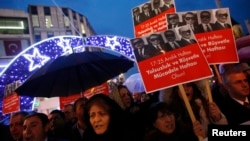Turkey’s state-run broadcaster has refused to air an election campaign advertisement by the main opposition Republican People’s Party, or CHP, because it directly criticizes the ruling Justice and Development Party, or AKP, prompting an outcry from press unions and civil rights activists.
The decision by the Turkish Radio and Television corporation comes just weeks before a crucial parliamentary election and as government pressure mounts on the country’s media, prompting protests from press unions and civil rights activists. They say the move is part of a months-long offensive on the media by the government involving gag orders, police raids, the off-and-on shutting down of social media sites, including Facebook and Twitter, and the launching of criminal investigations into journalists.
TRT channel’s pro-government stance has provoked strong criticism in recent weeks and last year journalist associations called for the broadcaster’s management to resign for failing to remain impartial during the presidential elections. TRT was also criticized by the country’s election board.
On Saturday, the state broadcaster declined an advert by the CHP, part of its electoral campaign launch ahead of the general election on June 7, arguing that it harshly targets the Islamist AKP government. The ad wasn’t run on any of TRT’s affiliates either but was broadcast by some private broadcasters.
The CHP’s deputy chairman, Enis Berberoğlu, posted TRT's statement on his Twitter account, saying, “TRT informed us via a written statement that it will not [be broadcasting] CHP’s…ad. Its justification for this decision is an example of black humor: The CHP ad criticizes the government. How can an opposition party engage in politics without targeting the ruling party in a democratic system? I am open to suggestions.”
Opposition politicians say TRT raised no objections to an earlier AKP advert that they argue manipulated religion and the Turkish flag; but TRT administrators say they had no choice but to refuse to air the CHP campaign commercial because it runs afoul of a law banning ads that include “defamatory and abusive remarks that go beyond criticism.”
The argument over the state broadcaster’s decision came as Prime Minister Ahmet Davutoğlu filed a legal complaint against the editor of Zaman newspaper, Bülent Keneş, over a blog article published in the English version of the daily newspaper that he says insulted him. His lawyer requested the Ankara chief public prosecutor initiate proceedings against Keneş.
The article that the prime minister took offense to was published on March 26. The article criticized him for failing to restrain President Recep Tayyip Erdoğan's authoritarian ambitions. “Like any ambitious person who is prone to become a dictator, Erdoğan exhibits his potential to threaten democracy, the rule of law and social peace, but it is Davutoğlu's willful political impotence that turns it into a real problem,” Kenes wrote.
Independent newspapers and broadcasters have long been locked in a battle with the AKP government, which says the media is all too frequently irresponsible in its coverage. In December, more than two dozen journalists were arrested in a government crackdown that prompted international criticism and claims that Turkey is sliding toward authoritarianism. The European Parliament rebuked Ankara for the December sweep of journalists, some of whom faced terrorism charges.
In January, President Erdoğan delivered a ferocious tongue-lashing targeting the secular opposition newspaper Cumhuriyet for publishing excerpts from the French magazine Charlie Hebdo as a gesture of solidarity in the wake of the terror attack that left eight of the French satirical magazine’s staff dead at the hands of gun-toting Islamic militants.
“Where do you think you live?” Mr. Erdoğan asked in a speech. “You cannot insult somebody’s sacred values with this.” Then he went on: “They may be atheists, but if they are, they will respect what is sacred to me. If they do not, it means provocation, which is punishable by laws.”
According to Haluk Koc, a leading member of the secularist CHP, the biggest opposition group in parliament, 21 journalists were jailed last year alone. “You even have a journalist detained for putting out tweets,” he said in reference to TV presenter Sedef Kabaş, who was arrested on a terrorism-related charge for tweeting about the shutting down by the government of a corruption probe.
Last week, Anne Brasseur, president of the Parliamentary Assembly of the Council of Europe, gave some support for the Turkish authorities temporarily shutting down social media sites for posting a photograph of a Turkish prosecutor who was taken hostage and killed by members of a leftist group. Last Wednesday, the Turkish president launched a tirade against the media for showing pictures of prosecutor Mehmet Selim Kiraz, who was kidnapped a few days earlier. The image showed the prosecutor being held captive with a gun to his head.
The Turkish leader said, “The press establishments who opened their pages and screens to terrorist propaganda were complicit in the murder of our prosecutor.” Kiraz was killed during a police operation to rescue him.
Brasseur said press freedom should be accompanied by media responsibility. "The press has also responsibility. Yes, media freedom, but no freedom without responsibility. There must also be a protection of private sphere," Brasseur said in remarks to reporters during a visit to Ankara.




